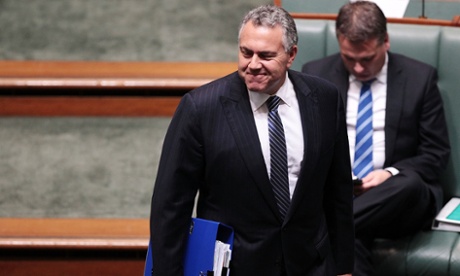Treating Australians as parasitic 'leaners' is a grave mistake
If the question were put to them, lots of Australians might be upset by
the prospect of working two weeks a year to boost the retirement
incomes of the wealthy
the prospect of working two weeks a year to boost the retirement
incomes of the wealthy

A month after its delivery, the first Abbott-Hockey budget is still
on the front pages, and in the worst possible way. Having failed to
convince the public of a budget emergency, Hockey appears to think he
can do better by treating the majority of the Australian public as
parasitic "leaners".
Unsurprisingly, the polls do not support this view. As a recent Essential poll has confirmed,
the great majority of Australians think equality and fairness are
important, and the plurality view (48% vs 23%) is that the country is
becoming less fair and equal.
As Bill Shorten has noted,
Hockey’s recent statements about the relative proportions of "lifters"
and "leaners" in the Australian population are reminiscent of US
presidential hopeful Mitt Romney’s remarks about the 47% of the US
population who are dependent on benefits – and would therefore vote for
Obama.
Both are factoids of the kind that circulate through the
right wing parallel universe of blogs, talk radio and spurious
thinktanks, and both seem to provide an explanation for resistance to
policies their proponents regard as self-evidently right.
There
are, however, a couple of crucial differences. First, Romney was never
silly enough to knowingly say such things in public. His remarks only
became known after he was caught on video speaking to supporters at a
private fundraiser.
Second, Hockey has, or ought to have, the
benefit of hindsight. Romney’s claim was a disaster in every sense. As a
factual claim, it was easily shown to be misleading at best. As a piece
of political positioning, it played into the worst stereotypes of
Romney as a heartless millionaire.
Romney, at least, did his best
to dodge the tag, turning up at stage-managed photo ops with
representatives of the working class like coal miners (ordered by their
bosses to attend, without pay, or be sacked). By contrast, Hockey seems determined to flaunt his status as the representative of the big end of town.
Like Romney,
Hockey denounces any criticism of the wealthy as "class warfare", while
practising his own version, aimed at mobilising resentment against the
undeserving poor. Hockey suggests that it is unfair that the average
Australian should work a month a year to support people on pensions and
benefits – the "leaners". The apparent basis for this is that government
welfare expenditure amounts to around 8.5% of national income.
In
the treasurer's estimation, pension and benefit recipients represent a
distinct class of "entitled" rent-seekers who are a burden on Australian
workers. But around half of the total welfare bill goes to old age
pensioners, the vast majority of whom have paid taxes to support the
pension system on which they now rely. It is hard to summon up much
outrage at the thought that we are working around two weeks a year to
protect ourselves against poverty in old age.
Moreover, as my colleague Flavio Menezes has pointed out,
expenditure on the old age pension is matched (or outweighed, depending
on the measure) by tax concessions on the savings devices preferred by
the rich: superannuation, and capital gains on negatively geared
investment properties. If the question were put to them, lots of
Australians might be upset by the prospect of working two weeks a year
to boost the retirement incomes of the wealthy.
Much the same
point may be made about other expenditures such as unemployment
benefits. At least 5% of the workforce is unemployed at any given time,
and a very large proportion will experience unemployment in any given
year. Moreover, the time we work to support the unemployed has been
falling steadily since the mid-1990s. Not only has the unemployment rate
fallen, but the benefit has been frozen in real terms, while average
earnings have risen by more than 40%.
A more direct adaptation of
the Romney 47% are claims of the form that "only 20% of Australians pay
any net tax" made, for example, by Adam Creighton in The Australian.
The key point to understand here is that, since government expenditure
is equal to revenue (actually slightly higher, but this doesn’t matter),
we collectively get back from government what we pay in, whether this
takes the form of cash payments or public services.
The same thing
would be true for an arithmetical average household, if such a thing
existed, although because income is distributed unequally, many more
households are below the arithmetic average income than are above. So,
this seemingly startling factoid is, in fact, a restatement of obvious
facts.
The hostile reception given to these Romneyesque arguments
is unsurprising. The fact that Hockey is relying on talking points that
failed even in the US is indicative of the level of delusion under which
the government is operating. Having run a disciplined and entirely
negative campaign, Abbott and Hockey ought to understand that they were
elected by default. They owe their jobs to the fact that voters were
sick of Labor’s leadership shenanigans.
The fiasco of the Senate
election is a pretty clear indication of a "plague on both your houses"
view. Instead, they appear to be under the impression that they were
granted a mandate for radical change – and long after the budget is off
the front page, the electorate will punish them for it.


No comments:
Post a Comment